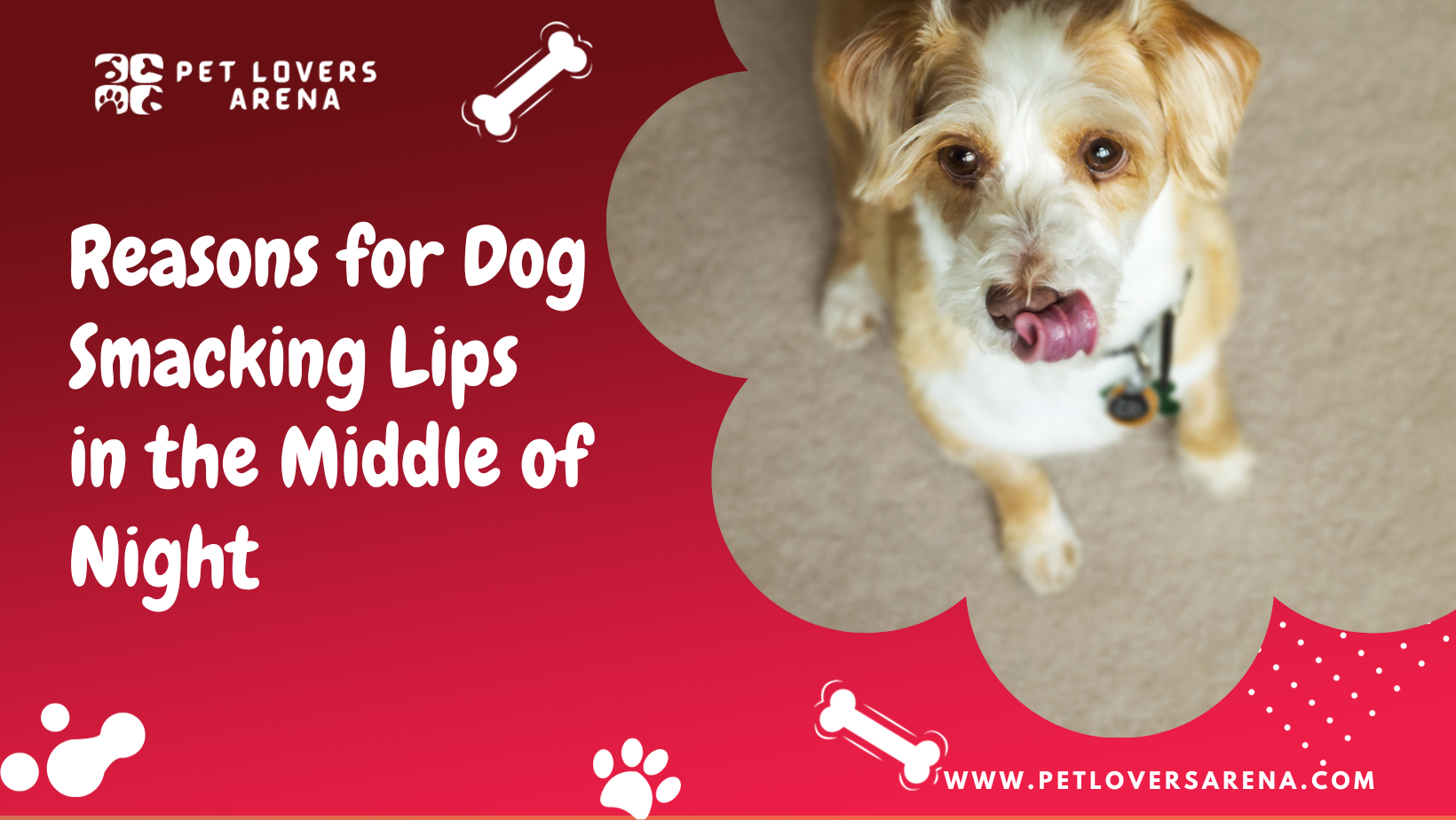It’s natural for dogs to lick their lips after ingesting something. This action may also serve as a means of communication. Also, if your dog drools a lot, you could notice it smacking its lips to clear it up. Smacking or licking the lips is a common instinct in dogs, and it is nothing to be concerned about.
However, if smacking of lips occurs in the middle of the night, it may cause alarm. Any living being’s night should be a period of relaxation without any unexpected movement. So, if your pooch’s sleep is getting disturbed by frequent lip-smacking events, you should not overlook it.
There may be a range of reasons why your dog might smack his lips in the middle of the night. As a result, this post aims to investigate why dogs lick their lips at night.
If you read to the end, you’ll find out
- Why do dogs smack their lips at night?
- What can you do to manage the situation?
- When should you worry?
So, let’s get this post started to calm your worried mind without further ado.
What is Smacking Lips?
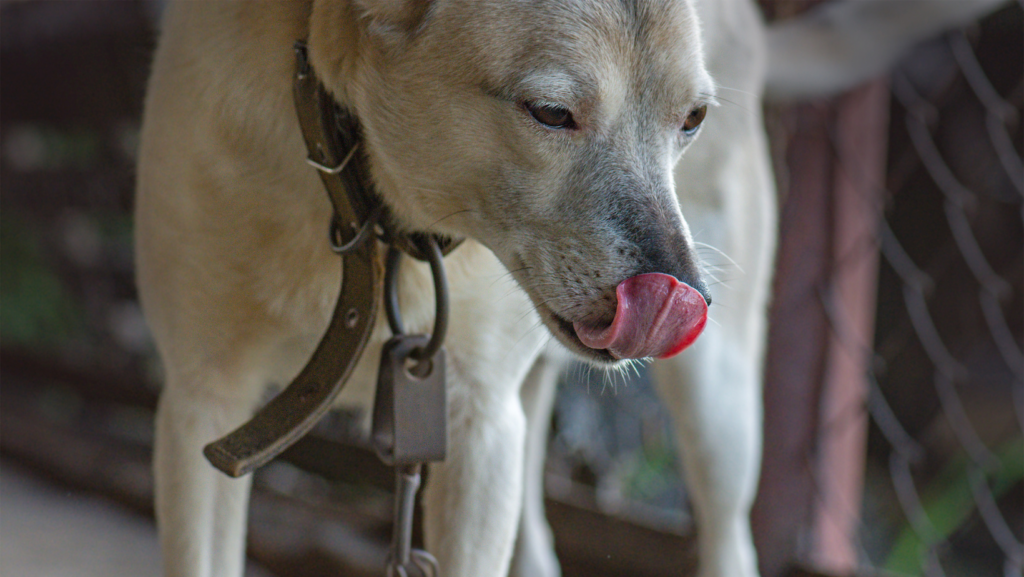
Smacking lips is an action that involves a loud opening and closing of the mouth, usually before or after eating. Lips smacking can indicate that the food was tasty or the person wants to consume more of it. However, if someone is smacking their lips excessively, there could be various underlying problems.
Dogs smack their lips in the same way that humans do. And if you notice this behavior in them too frequently for no apparent reason, you should read between the lines. There could be certain underlying factors that, while not obvious, are causing the dog to lick its lips excessively.
Remember that any action takes place under certain circumstances and is not devoid of context. As a result, delve deeper to uncover the reason for the lip-smacking behavior. It’s possible that you cannot find a straightforward explanation for this behavior, but that doesn’t mean there isn’t one.
12 Surprising Reasons for Dog Smacking Lips in the Middle of Night
Here, we’ve compiled a list of 12 plausible causes for dogs to lick their lips in the middle of the night. This is an endless list that includes some of the most prevalent causes of dogs licking their lips. So, to be absolutely sure why your dog is exhibiting this behavior, you should always consult a vet.
1. Nausea
Dogs are known for licking their lips after finishing a meal. However, it’s also viable that your dog is licking its lips because it ate too much, too quickly, or something harmful. So, if your dog licks lips and displays signs of an upset stomach, you should expect him to vomit soon. Vomiting may be a dog’s effective approach to relieve abdominal pressure.
Saliva is occasionally present in the mouth before vomiting. And smacking lips is a physiological reaction to excess saliva accumulating in the mouth prior to vomiting.
What to Do?
In most circumstances, you’ll need to pay attention to the dog’s actions. That said, being occasionally nauseated should not be cause for concern. However. after your dog vomits, you can restrict feeding for a few hours. Also, if the behavior persists, including symptoms like fever, decreased appetite, blood in the vomit, etc., see your veterinarian right once.
2. Hunger
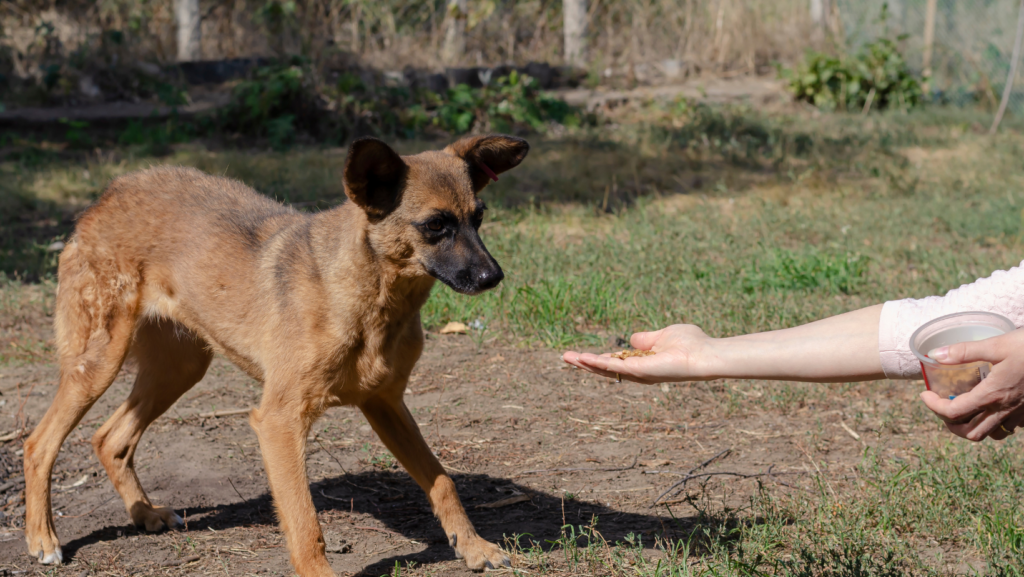
Many health problems, such as nausea and acid reflux, can be caused by hunger. And these health problems may cause your dog to lick his lips frequently. So, if your dog hasn’t eaten before going to bed, he might lick his lips out of hunger. An empty stomach indicates that your dog’s mouth and neck are irritated, leading him to smack his lips excessively.
You should also be aware that dogs have a keen sense of smell. As a result, if your pet makes a smacking noise late at night, he may have sensed food.
What to Do?
Offer small servings of food to your dog regularly to prevent him from skipping meals. Also, make sure they’ve had an evening meal or snacks to avoid being on an empty stomach for too long. If your dog has an upset stomach, offer him easy-to-digest foods like chicken, bananas, etc.
3. Bilious Vomiting Syndrome
If your dog licks his lips at night and vomits green or yellow fluids, he may have bilious vomiting syndrome, often known as ‘bile reflux.’
The liver produces bile, a greenish-yellow ‘juice.’ bile enters the small intestine during digestion and aids in the breakdown of meals. However, this bile can sometimes also enter the stomach and irritate it.
If your dog has bile reflux, he may exhibit symptoms such as frequent lip-smacking and nausea at night. Other symptoms include stomach pain, a loss of appetite, etc.
What To Do?
Bile reflux can be caused by an extended period of an empty stomach. As a result, make sure you feed your dog regularly, with tiny but frequent meals, especially at night. If the symptoms persist, it’s critical to see a veterinarian for a diet adjustment and any necessary treatments.
4. Dry Mouth
A dry mouth condition, or Xerostomia, is a medical condition where the salivary glands fail to produce sufficient saliva to keep the moisture level of the mouth intact. Your dog may experience discomfort in the mouth due to this problem, causing them to lick their lips more frequently. Additional signs of this problem may include:
- Breath problems
- Gums swollen
- Saliva with a thick consistency
- Chewing difficulties, etc.
Dry mouth is a problem that canines experience as they get older. So, if you have a senior dog, keep a check on their lip-smacking behavior. Xerostomia is more common in dogs who have cancer and are receiving immunotherapy.
Dehydration, medication allergies, nerve damage, immunological insufficiency, and other factors might also cause a dry mouth.
What to Do?
If your dog does not have a pre-existing condition, the following techniques can assist him in preventing developing a dry mouth:
- Encourage him to drink more fluid.
- Give him fluids regularly.
- Replace the old water with fresh, clean water.
- Provide your dog with wet food more frequently.
- Wash your dog’s mouth regularly.
- Take care of your dog’s oral hygiene.
Bonus Read: 7 Best Homemade Dog Food Recipes For Big Dogs
5. Acid Reflux
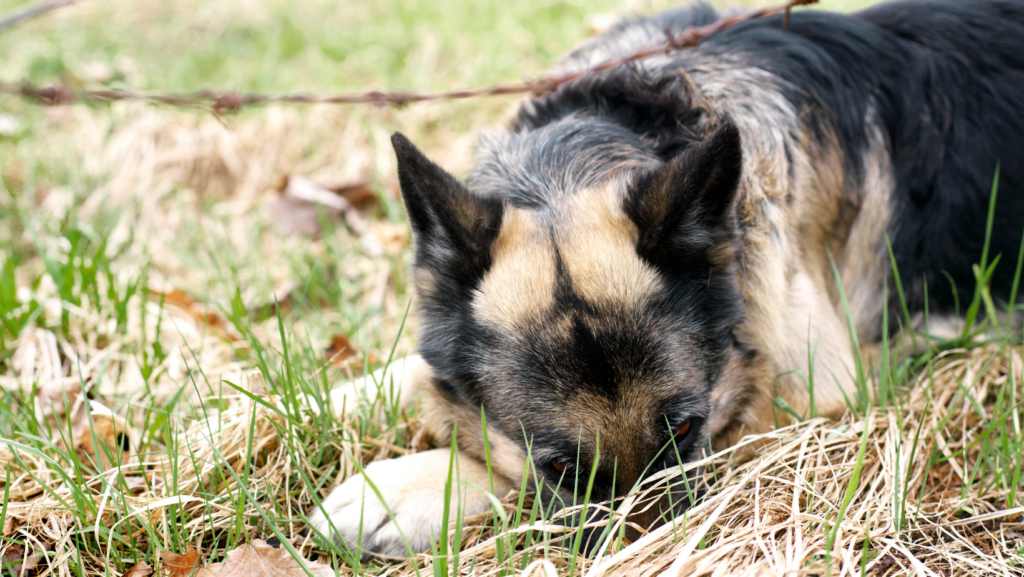
Dogs, like people, suffer from acid reflux. This syndrome arises when stomach contents go back and forth into the esophagus or food pipe. Acid reflux causes dogs to drool and lick their lips regularly.
If your dog has acid reflux at night, he may feel restless and unable to sleep. He might also vomit to relieve the pressure in his stomach. That being said, fever, excessive drooling, poor breath, loss of appetite, and other signs should be looked for.
Excessive eating, as well as food sensitivities, can cause acid reflux. So, to avoid a situation like this, check for foods that could trigger allergies in your dog.
What to Do?
If it is not severe, you can manage acid reflux at home. Follow the below steps to get positive results:
- Offer you dog food that is low in fat.
- Feed smaller but frequent meals.
- Do not keep your dog hungry for long.
But for severe cases, vet prescribed medicines could be the best solution.
6. Necrotizing Sialometaplasia
Necrotizing sialometaplasia is a rare condition that causes your dog to smack his lips frequently. It’s an inflammatory condition that affects dogs’ salivary glands. Some of the symptoms that this rare condition might cause include:
- Nausea
- Lip-smacking
- Gulping
- Dysphagia
- Pain in the mandibular region, etc.
What to Do?
If you observe any of the symptoms mentioned above in your dog, consult a vet immediately. It is recommended not to manage the situation at home without any medical guidance.
7. Sialadenosis
Sialadenosis is the total opposite of Xerostomia, in which your dog’s salivary glands swell and cause excessive saliva or pus deposition in the mouth. Infection in the salivary glands, trauma, and other factors may contribute to this illness.
In layman’s terms, irritated salivary glands due to Sialadenosis cause dogs to gag, smack their lips, and swallow often. Although doctors have yet to discover the cause of Sialadenosis in dogs, it is not unheard of among canines.
You should check on your dog to find the following symptoms of Sialadenosis.
- Fever
- Depression
- Swollen salivary glands
- Nasal discharge
- Low level of activity
- Snorting
- Unexplained weight loss, etc.
It should be worth noting that Sialadenosis is commonly found in dogs affected with rabies, distemper, and the paramyxovirus.
What to Do?
If you suspect your dog is suffering from Sialadenosis symptoms, you should seek medical advice as soon as possible.
8. Recent Eating
Late-night eating could be the reason for your dog’s smacking lips in the middle of the night. You may hear your dog making a smacking sound if he goes to bed without eating his dinner and decides to finish it later in the night. It’s important to remember that late-night munching is bad for your dog’s health. According to scientific research, late-night snacking may contribute to harmful weight gain.
What to Do?
Feed your dog early during the daytime and between 6-7 p.m. to prevent late-night munching tendencies. Giving your dog a little food at regular intervals can also be beneficial. However, remember that it takes roughly 4 to 6 hours for the food to be fully absorbed from the stomach in the canine gastrointestinal system. As a result, overfeeding your dog right before he tucks into bed could damage his health.
9. Dehydration
As we described earlier, a dry mouth might drive dogs to smack their lips. One of the causes of a dry mouth is dehydration. As a result of the excessive dehydration, your dog may lick his mouth to moisten his gums.
Lift the skin across the dog’s shoulder and behind to check if he’s dehydrated. If the skin doesn’t bounce back right away, your dog may need to drink additional water to stay hydrated. You can also examine their gums for dryness, stickiness, and peeling. If you notice problems with your dog’s gums, he may be dehydrated.
Dehydration is a problem that should never be overlooked, as it can be fatal.
What to Do?
Freshwater should be given to your dog regularly. Also, you should replace your dog’s water once a day to encourage him to drink more. Also, replace his dry foods with wet foods so that his body may absorb more liquids and stay hydrated. Finally, consult a veterinarian if your pet is extremely dehydrated and no home methods offer him comfort.
10. Discomfort
If your dog is in any physical discomfort, he may smack his lips, even in the middle of the night. Lip-smacking can be a telltale indicator that a dog is in agony. So see if your dog has had any recent injuries or health issues that could be causing him pain, keep a close eye on them. You can also lightly examine the portions of their body by pressing them to confirm any tenderness. However, do not exert too much pressure!
Keep an eye on your elderly dog in this situation since they may have arthritis, hip or elbow dysplasia, or other health issues.
What to Do?
If you observe your dog in pain or licking his lips constantly, take him to the vet as soon as possible. The pain may give them sleepless nights, impairing their ability to operate normally.
11. Emotional Distress
Dogs, like people, can experience psychological trauma that causes them to lick their lips. In fact, stressed dogs are more likely to engage in this behavior.
Your dog may experience emotional distress due to a variety of factors, including thunderstorms, gunshots, being surrounded by strangers, a change in habit, being afraid of something in the middle of the night, and so on.
So, if your dog starts licking his lips in the middle of the night, look for other signs like panting, pinner ears, tucked-in tail, rigid facial or body expression, and so on. These symptoms are frequently accompanied by emotional distress.
What to Do?
If your dog appears to be in distress, soothe them by speaking to them in a calm voice and assuring them that they are in a secure environment. Do not reward them for their nervousness but give them time to settle down calmly. Investigate external stressors causing your dog’s emotional distress and strive to eliminate them.
Allow your dog time and space to exercise on a daily basis. Doing so will keep their physical and mental health checked. However, if your dog continues to display indications of distress and anxiety, you should seek the advice of a veterinarian.
12. Dreaming
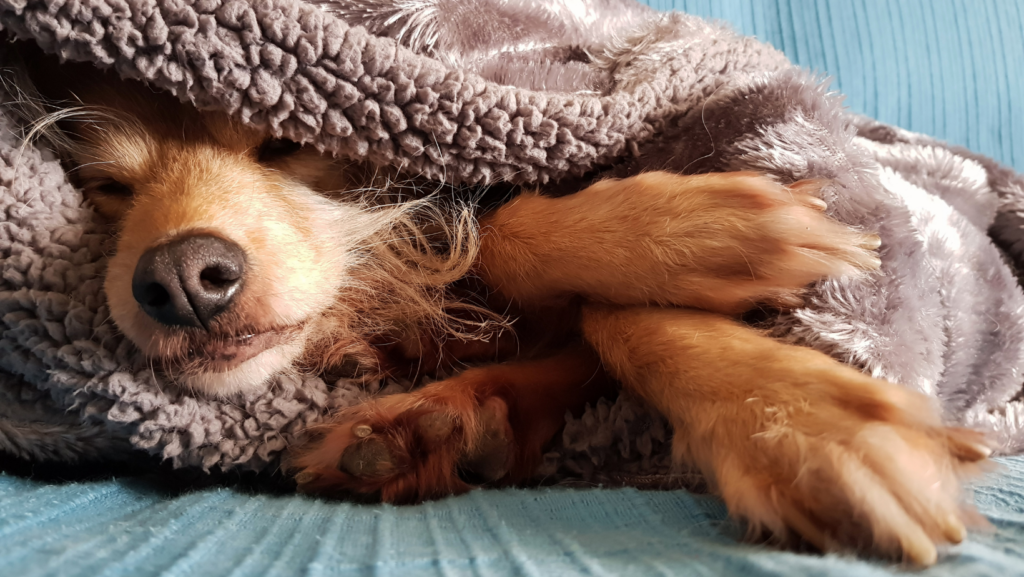
Humans aren’t the only ones who dream. Dogs, according to the AKC, do dream.
Surprised?
Don’t be. However, you might wonder, “What do dogs dream about?“
According to studies, dogs’ dream patterns are comparable to humans’. For example, dogs can relive a past or see something they like in their dreams. So it’s possible that your dog is dreaming about a juicy chicken leg and keeps licking his lips as if he is eating it.
What to Do?
Check your dog to see whether he’s sleeping and licking lips or if there’s anything else going on. While dreaming and smacking your lips, as a result, is not harmful, you should not ignore any other health-related concerns.
When to Worry?
If your dog frequently licks his lips at night, you should be concerned, especially if they do it regularly.
Also, if you have a senior dog who licks his lips excessively, you should not disregard the activity because they are more susceptible to infections and diseases.
Examine whether the act of lip-smacking is accompanied by other symptoms such as nausea, fever, lack of appetite, or pain. If your dog displays any of the signs mentioned above, you should have him examined by a veterinarian.
You can shoot videos or click images of your dog’s actions to let the veterinarian notice your dog’s behavior changes. This can lead to a more accurate diagnosis.
Summary
Before we wrap up, we’d want to emphasize that, whatever the cause, if your dog licks his lips regularly, you should investigate further. There could be various reasons why your dog is behaving this way. Never disregard your dog’s behavior and never try to solve a problem at home without consulting a veterinarian.
Remember that prompt action can rescue your dog from serious harm.
Meet John Patterson, an accomplished Dog Trainer and a dedicated advocate for building strong human-canine relationships.With years of experience as a Professional Dog Trainer, John firmly believes that well-trained dogs are a reflection of patient guidance and unwavering care. Beyond his training skills, he finds solace in grooming and playing with dogs, nurturing their physical and emotional well-being.

